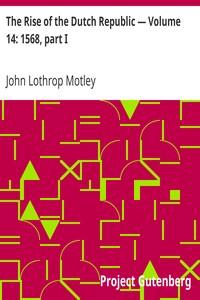|
|
Read this ebook for free! No credit card needed, absolutely nothing to pay.Words: 18621 in 4 pages
This is an ebook sharing website. You can read the uploaded ebooks for free here. No credit cards needed, nothing to pay. If you want to own a digital copy of the ebook, or want to read offline with your favorite ebook-reader, then you can choose to buy and download the ebook.

: The Rise of the Dutch Republic — Volume 06: 1560-61 by Motley John Lothrop - Netherlands History Eighty Years' War 1568-1648; Netherlands Church history@FreeBooksTue 06 Jun, 2023 Edition: 10 MOTLEY'S HISTORY OF THE NETHERLANDS, PG EDITION, VOLUME 6. THE RISE OF THE DUTCH REPUBLIC JOHN LOTHROP MOTLEY, D.C.L., LL.D. Agitation in the Netherlands--The ancient charters resorted to as barriers against the measures of government--"Joyous entrance" of Brabant--Constitution of Holland--Growing unpopularity of Antony Perrenot, Archbishop of Mechlin--Opposition to the new bishoprics, by Orange, Egmont, and other influential nobles--Fury of the people at the continued presence of the foreign soldiery--Orange resigns the command of the legion--The troops recalled--Philip's personal attention to the details of persecution--Perrenot becomes Cardinal de Granvelle--All the power of government in his hands--His increasing unpopularity--Animosity and violence of Egmont towards the Cardinal--Relations between Orange and Granvelle--Ancient friendship gradually changing to enmity--Renewal of the magistracy at Antwerp--Quarrel between the Prince and Cardinal--Joint letter of Orange and Egmont to the King--Answer of the King--Indignation of Philip against Count Horn--Secret correspondence between the King and Cardinal--Remonstrances against the new bishoprics--Philip's private financial statements--Penury of the exchequer in Spain and in the provinces--Plan for debasing the coin--Marriage of William the Silent with the Princess of Lorraine circumvented--Negotiations for his matrimonial alliance with Princess Anna of Saxony-- Correspondence between Granvelle and Philip upon the subject-- Opposition of Landgrave Philip and of Philip the Second--Character and conduct of Elector Augustus--Mission of Count Schwartzburg-- Communications of Orange to the King and to Duchess Margaret-- Characteristic letter of Philip--Artful conduct of Granvelle and of the Regent--Visit of Orange to Dresden--Proposed "note" of Elector Augustus--Refusal of the Prince--Protest of the Landgrave against the marriage--Preparations for the wedding at Leipzig--Notarial instrument drawn up on the marriage day--Wedding ceremonies and festivities--Entrance of Granvelle into Mechlin as Archbishop-- Compromise in Brabant between the abbeys and bishops. The years 1560 and 1561 were mainly occupied with the agitation and dismay produced by the causes set forth in the preceding chapter. Against the arbitrary policy embodied in the edicts, the new bishoprics and the foreign soldiery, the Netherlanders appealed to their ancient constitutions. These charters were called "handvests" in the vernacular Dutch and Flemish, because the sovereign made them fast with his hand. As already stated, Philip had made them faster than any of the princes of his house had ever done, so far as oath and signature could accomplish that purpose, both as hereditary prince in 1549, and as monarch in 1555. The reasons for the extensive and unconditional manner in which he swore to support the provincial charters, have been already indicated. Of these constitutions, that of Brabant, known by the title of the 'joyeuse entree, blyde inkomst', or blithe entrance, furnished the most decisive barrier against the present wholesale tyranny. First and foremost, the "joyous entry" provided "that the prince of the land should not elevate the clerical state higher than of old has been customary and by former princes settled; unless by consent of the other two estates, the nobility and the cities." Again; "the prince can prosecute no one of his subjects nor any foreign resident, civilly or criminally, except in the ordinary and open courts of justice in the province, where the accused may answer and defend himself with the help of advocates." Further; "the prince shall appoint no foreigners to office in Brabant." Lastly; "should the prince, by force or otherwise, violate any of these privileges, the inhabitants of Brabant, after regular protest entered, are discharged of their oaths of allegiance, and as free, independent and unbound people, may conduct themselves exactly as seems to them best." Such were the leading features, so far as they regarded the points now at issue, of that famous constitution which was so highly esteemed in the Netherlands, that mothers came to the province in order to give birth to their children, who might thus enjoy, as a birthright, the privileges of Brabant. Yet the charters of the other provinces ought to have been as effective against the arbitrary course of the government. "No foreigner," said the constitution of Holland, "is eligible as, councillor, financier, magistrate, or member of a court. Justice can be administered only by the ordinary tribunals and magistrates. The ancient laws and customs shall remain inviolable. Should the prince infringe any of these provisions, no one is bound to obey him." Free books android app tbrJar TBR JAR Read Free books online gutenberg More posts by @FreeBooks
: The Rise of the Dutch Republic — Volume 04: 1555-59 by Motley John Lothrop - Netherlands History Eighty Years' War 1568-1648; Netherlands Church history@FreeBooksTue 06 Jun, 2023

: The Rise of the Dutch Republic — Volume 03: 1555 by Motley John Lothrop - Netherlands History Eighty Years' War 1568-1648; Netherlands Church history@FreeBooksTue 06 Jun, 2023
|
Terms of Use Stock Market News! © gutenberg.org.in2025 All Rights reserved.






